Year 241 BC was a year of the pre-Julian Roman calendar. At the time it was known as the Year of the Consulship of Atticus and Cerco. The denomination 241 BC for this year has been used since the early medieval period, when the Anno Domini calendar era became the prevalent method in Europe for naming years.
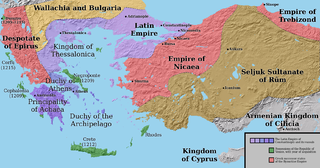
Year 1205 (MCCV) was a common year starting on Saturday of the Julian calendar.
This article concerns the period 249 BC – 240 BC.

Louis VIII, nicknamed The Lion, was King of France from 1223 to 1226. From 1216 to 1217, he also claimed the Kingdom of England. Louis was the only surviving son of King Philip II of France by his first wife, Isabelle of Hainaut, from whom he inherited the County of Artois.
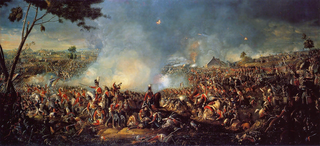
The Hundred Days War, also known as the War of the Seventh Coalition, marked the period between Napoleon's return from eleven months of exile on the island of Elba to Paris on 20 March 1815 and the second restoration of King Louis XVIII on 8 July 1815. This period saw the War of the Seventh Coalition, and includes the Waterloo Campaign, the Neapolitan War as well as several other minor campaigns. The phrase les Cent Jours was first used by the prefect of Paris, Gaspard, comte de Chabrol, in his speech welcoming the king back to Paris on 8 July.

In the War of the Sixth Coalition, sometimes known in Germany as the War of Liberation, a coalition of Austria, Prussia, Russia, the United Kingdom, Portugal, Sweden, Spain and a number of German States defeated France and drove Napoleon into exile on Elba. After the disastrous French invasion of Russia of 1812 in which they had been forced to support France, Prussia and Austria joined Russia, the United Kingdom, Sweden, Portugal and the rebels in Spain who were already at war with France.

William of Villehardouin was the fourth prince of Achaea in Frankish Greece from 1246 to 1278. The younger son of Prince Geoffrey I, he held the Barony of Kalamata in fief during the reign of his elder brother Geoffrey II. William started to rule Achaea as regent for his brother during Geoffrey's military campaigns against the Greeks of Nicaea who were the principal enemies of his overlord, the Latin Emperor of Constantinople Baldwin II. William succeeded his childless brother in the summer of 1246. Conflicts between Nicaea and Epirus enabled him to complete the conquest of the Morea in about three years. He captured Monemvasia and built three new fortresses, forcing two previously autonomous tribes, the Tzakones and Melingoi into submission. He participated in the unsuccessful Egyptian crusade of Louis IX of France who rewarded him with the right to issue currency in the style of French royal coins.

The Fourth Coalition fought against Napoleon's French Empire and were defeated in a war spanning 1806–1807. The main coalition partners were Prussia and Russia with Saxony, Sweden, and Great Britain also contributing. Excluding Prussia, some members of the coalition had previously been fighting France as part of the Third Coalition, and there was no intervening period of general peace. On 9 October 1806, Prussia joined a renewed coalition, fearing the rise in French power after the defeat of Austria and establishment of the French-sponsored Confederation of the Rhine. Prussia and Russia mobilized for a fresh campaign with Prussia massing troops in Saxony.

The Mongol invasion of Europe in the 13th century occurred from the 1220s into the 1240s. In Eastern Europe, the Mongols conquered Volga Bulgaria, Cumania, Alania, and the Kievan Rus' federation. In Central Europe, the Mongol armies launched a two-pronged invasion of fragmented Poland, culminating in the Battle of Legnica, and the Kingdom of Hungary, culminating in the Battle of Mohi. Invasions also were launched into the Caucasus against the Kingdom of Georgia and the Chechens and Ingush, as well as into the Balkans against Croatia, the Second Bulgarian Empire, and the Latin Empire. The operations were planned by General Subutai (1175–1248) and commanded by Batu Khan and Kadan. Both men were grandsons of Genghis Khan. Their conquests integrated much of Eastern European territory into the empire of the Golden Horde. Warring European princes realized they had to cooperate in the face of a Mongol invasion, so local wars and conflicts were suspended in parts of central Europe, only to be resumed after the Mongols had withdrawn. After the initial invasions, subsequent raids and punitive expeditions continued into the late 13th century.
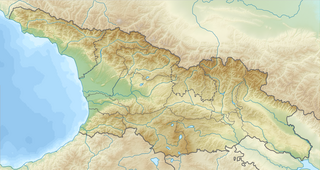
The Battle of Didgori was fought between the armies of the Kingdom of Georgia and the Great Seljuq Empire at the narrow place of Didgori, 40 km west of Tbilisi, on August 12, 1121. The large Muslim army, under the command of Ilghazi, was unable to maneuver, and suffered a devastating defeat due to King David IV of Georgia’s effective military tactics.
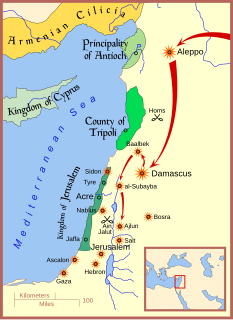
Starting in the 1240s, the Mongols made repeated invasions of Syria or attempts thereof. Most failed, but they did have some success in 1260 and 1300, capturing Aleppo and Damascus and destroying the Ayyubid dynasty. The Mongols were forced to retreat within months each time by other forces in the area, primarily the Egyptian Mamluks. Since 1260, it had been described as the Mamluk-Ilkhanid War.

The Treaty of the Pruth was signed on the banks of the river Prut between the Ottoman Empire and the Tsardom of Russia on 23 July 1711 ending the Russo-Turkish War of 1710–1711. The treaty was a political victory for the Ottoman Empire.

Al-Malik al-Zahir Rukn al-Din Baibars al-Bunduqdari, of Turkic Kipchak origin, commonly known as Baibars – nicknamed Abu al-Futuh – was the fourth sultan of Egypt in the Mamluk Bahri dynasty, succeeding Qutuz. He was one of the commanders of the Egyptian forces that inflicted a defeat on the Seventh Crusade of King Louis IX of France. He also led the vanguard of the Egyptian army at the Battle of Ain Jalut in 1260, which marked the first substantial defeat of the Mongol army and is considered a turning point in history.

The Crusade of Varna was an unsuccessful military campaign mounted by several European leaders to check the expansion of the Ottoman Empire into Central Europe, specifically the Balkans between 1443 and 1444. It was called by Pope Eugene IV on 1 January 1443 and led by King Władysław III of Poland, John Hunyadi, Voivode of Transylvania, and Duke Philip the Good of Burgundy.

Forge of War is a five-issue American comic book limited series from Boom! Studios, written by Dan Abnett and Ian Edginton.

Several attempts at a Franco-Mongol alliance against the Islamic caliphates, their common enemy, were made by various leaders among the Frankish Crusaders and the Mongol Empire in the 13th century. Such an alliance might have seemed an obvious choice: the Mongols were already sympathetic to Christianity, given the presence of many influential Nestorian Christians in the Mongol court. The Franks were open to the idea of support from the East, in part owing to the long-running legend of the mythical Prester John, an Eastern king in an Eastern kingdom who many believed would one day come to the assistance of the Crusaders in the Holy Land. The Franks and Mongols also shared a common enemy in the Muslims. However, despite many messages, gifts, and emissaries over the course of several decades, the often-proposed alliance never came to fruition.
Georgian–Seljuk wars, also known as Georgian Crusade, is a long series of battles and military clashes that took place from c. 1048 until 1213, between the Kingdom of Georgia and the different Seljuqid states that occupied most of Transcaucasia. The conflict is preceded by deadly raids in the Caucasus by the Turks in the 11th century, known in Georgian historiography as the Great Turkish Invasion.
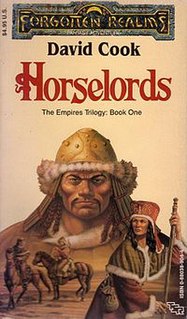
Horselords is a fantasy novel by David Cook, set in the world of the Forgotten Realms, and based on the Dungeons & Dragons role-playing game. It is the first novel in "The Empires Trilogy". It was published in paperback in May 1990.

Dragonwall is a fantasy novel by Troy Denning, set in the world of the Forgotten Realms, and based on the Dungeons & Dragons role-playing game. It is the second novel in "The Empires Trilogy". It was published in paperback in August 1990.
Mongol incursions in the Holy Roman Empire took place in the spring of 1241 and again in the winter of 1241–42. They were part of the first great Mongol invasion of Europe.
















